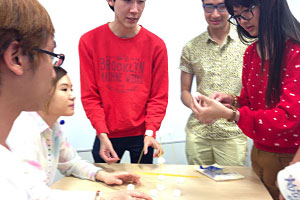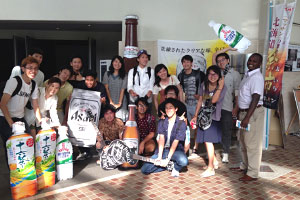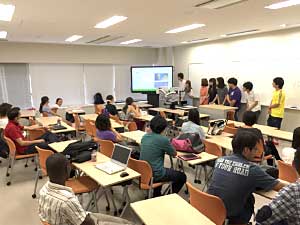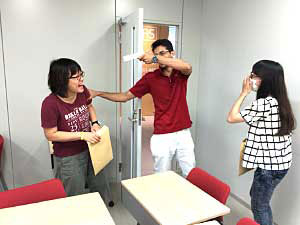The Essence of PBL Courses
International PBL Seminar
International PBL (Problem/Project-based Learning) Seminar kicked off in 2015 as a part of “Global PLB for Innovative mind and Intelligence” in Re-inventing Japan Project. Students of various backgrounds filled the classroom; Ritsumeikan students (mostly Japanese) coming back from one-semester exchange program in Thailand and Indonesia in the last Fall semester in 2014, Ritsumeikan students who will be going to Thailand and Indonesia for one semester during the Fall semester in 2015, and also international students coming from Indonesia and Thailand for one semester at Ritsumeikan, totally 19 students. Their field of study also varies; economics, architecture, accountancy and policy science.
PBL seminar was divided into two sessions; the first was led by Assistant Prof. Piyada Chonlaworn under three main themes; Japanese history and culture, socio-economic problems and environmental issues. Students discussed these issues from their experience and data-gathering and compared with one another's country. At the end of the first session, we took a trip to Ibaraki City Environment and Garbage Incineration Center where students learned how a large amount of garbage are separated and incinerated. The second session was led by Assistant Prof. Otieno Francis. The topic was mainly about marketing and economics with a field trip to a beer-brewing factory in Osaka. Given different backgrounds of students, this course was considered a fruitful subject where Japanese and international students got to know one another through group work and discussions.
In the second session, students were introduced to the business strategy and decision making through a case based approach. Subsequently, by focusing on the ASEAN countries, students had to select a country and develop a viable business proposal that could be hypothetically setup in the particular country based on the socio-economic cultural and political environment for the selected country. In order to reinforce concepts of creativity, team building and innovation, interesting but pedagogical games were used, this made students realize the importance of strategically working together even though they were in groups consisting of members from different countries. Some of the games included the famous marshmallow and spaghetti tower games as illustrated in the pictures below. Moreover, the field trip was made to Asahi breweries, here the students had the opportunity to witness the intriguing and detailed process of beer processing, in addition the students were introduced to the business model and marketing activities that Asahi uses in order to be the market leader in terms of units and sales. The students also had the chance to engage in discussions with the company representative on the international expansion strategies of Asahi especially in the ASEAN countries.
Through group work among students with different backgrounds, site-visit, discussion, presentations and reports assignments, students cultivated the understanding of problem and ability to propose creative solutions to the problems based on cross-cultural understanding.

Game for team building

Asahi Breweries Suita Factory
Gaming Simulation
The College of Policy Science has introduced a course called ‘Gaming Simulation Method,’ where students can deepen their understanding of societies and policies by playing simulated games and also designing and developing games by themselves. Simply speaking, Gaming Simulation refers to designing games that incorporate simple models induced from important components of societal (systems). Through playing the games, players can experience how systems work by taking up roles as actors that they themselves would not be in the real world such as presidents of companies, etc. This course provided opportunities to students to learn the relations between games and societal issues through playing games focused on disaster mitigation, decision-making, international trading etc. In the latter part of the course, students designed games by themselves and played them with other registered students.
One group designed a game on drug trafficking, where police tried to arrest drug dealers while drug dealers try to profit from their trade without the knowledge of the police, through this game, players experienced how black markets function. Another group designed a game that incorporated economic systems such as capitalism and socialism, participants were then able to experience the effects of several economic systems and events such as company mergers. One other group designed a game on illegal logging based on the treasure hunting game using cards to represent timber as a resource. And yet another group made a game for disaster management where players learned to experience the importance of preparing alternatives to overcome catastrophic events.
In the designing of gaming simulations, it is prudent not only to make the games fun but also to develop games that have the potential of giving deep insights into the complicated societal structures implement simple models into the games. The project had profound impact on the students because they could learn this process by experience.
This course is designated as ‘strongly recommended’ for exchange students of AIMS (ASEAN International Mobility for Students) Program and was taken not only by students in CRPS (Community and Regional Policy Studies major) but also the exchange students from Indonesia and Thailand under the AIMS program.

Presenting importance of a game

Police trying to arrest drug dealer
GSG (Global Simulation Gaming)
Coming soon
Special Lecture (Core Related Course)
Coming soon

